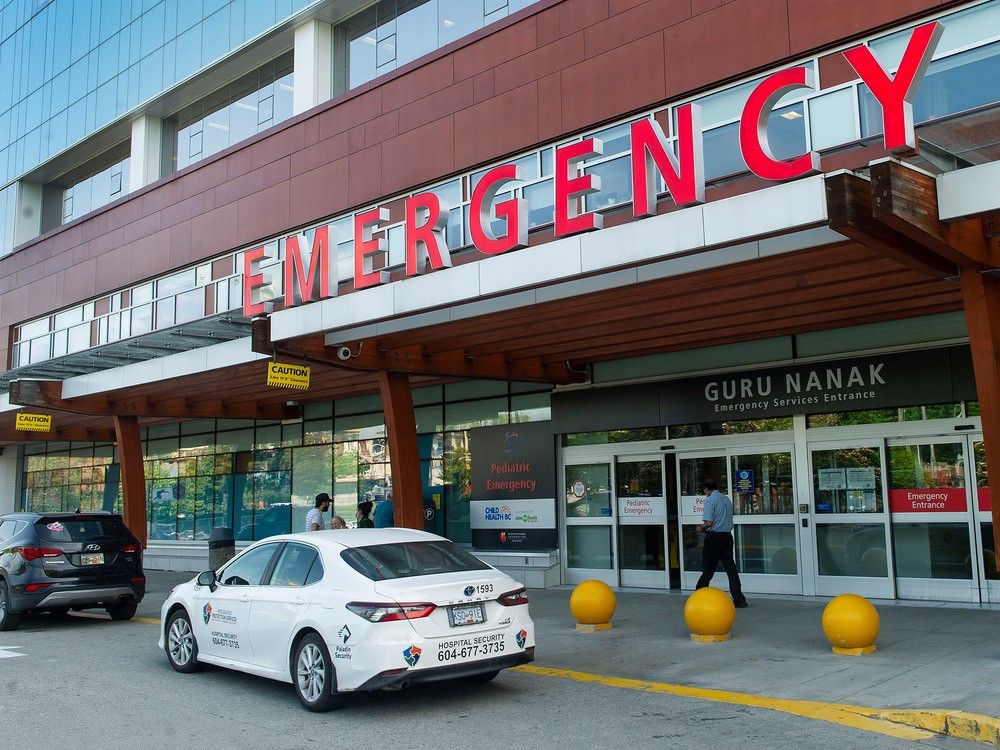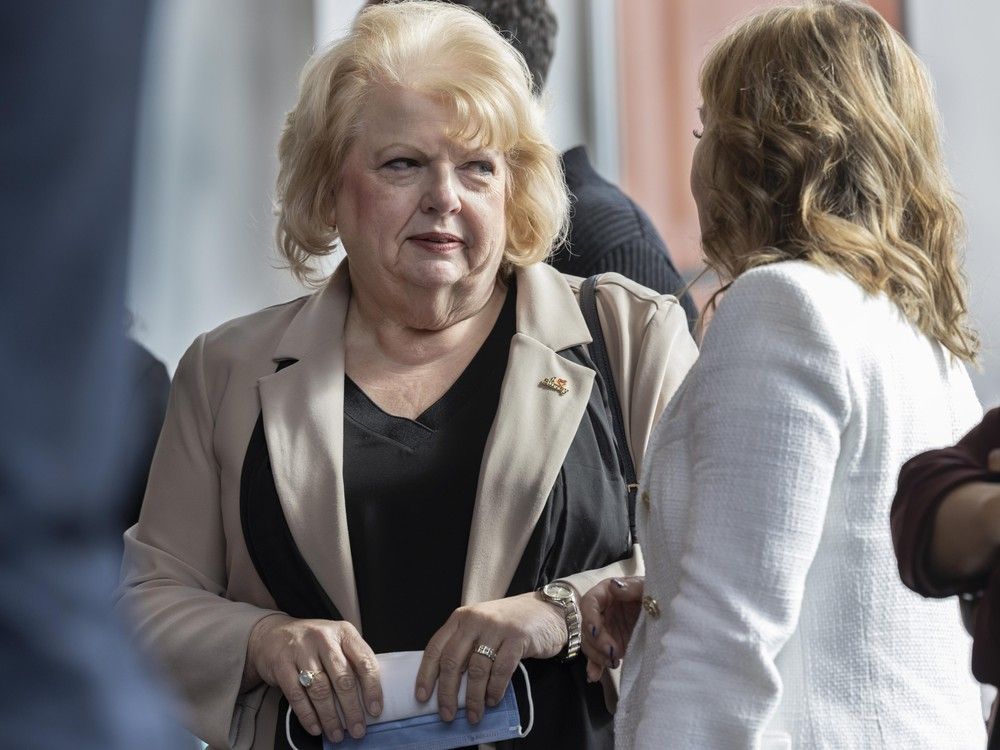
When Delta’s emergency room closed Saturday night due to a doctor shortage, the impact rippled through neighbouring Surrey, said Mayor Brenda Locke.
Patients and ambulances were diverted to Surrey Memorial Hospital, which already has the busiest ER in Canada.
“Surrey became virtually closed as well, just for the fact that we cannot cope with that kind of pressure,” said the mayor.
Faced with a health-care crisis, Surrey has decided to take matters into its own hands with a plan to hire a health care administrator and open new medical clinics in city-owned buildings. Earlier this week, the city issued a request for proposals for a proponent to open and operate a network of community-based medical clinics. The city will pay administration costs, while doctors will continue to be paid through the provincial medical services plan.
“We can’t wait any longer,” said Locke. “Diverting patients away from our hospital is really critical for us. Getting people family doctors that they can go to and rely on is important to health care on all levels.”
Surrey Coun. Linda Annis, who is running for mayor in next year’s election, accused Locke of shifting health-care costs from the province to municipal taxpayers, saying the health minister would be “smiling from ear-to-ear” at the plan.
“What we have here is the start of a costly, bureaucratic nightmare for our taxpayers, something that will only grow in size and cost over time,” she said in a news release. “Health care is the province’s job, but they would love nothing more than to download costs on our taxpayers.”

But Locke said it was clear to her the city had to act in the best interests of its residents.
“We have been underserved, there’s no doubt about that,” she said. “But we are in the here and now, and we can’t wait any longer for things to change, so we wanted to put the best we could forward to make sure that we’re attracting doctors.”
Surrey has approximately 59 family doctors per 100,000 residents — less than half the 136 per 100,000 residents in Vancouver.
With a new medical school opening at Simon Fraser University’s Surrey campus in 2026, Locke said Surrey is hoping to provide attractive opportunities for graduates to work in the city.
Here are the details of Surrey’s plan:
When will the clinics open?
Surrey plans to select a person or company to open and operate the clinics by the end of the year, with the first clinic to open in mid-2026. The clinics will not be walk-in clinics, but rather staffed with family doctors with a typical patient roster.
Surrey is seeking a proponent that can “identify optimal clinic locations and provide conceptual planning and design support,” as well as operate the clinics, including oversight of staffing, administration and collaboration with SFU medical school to establish clinical teaching partnerships.
Where will the clinics be located?
Locke said the city owns a number of buildings that could be suitable.
“We’re going to start with two,” she said. “We have two locations already in our sight lines.”
The city will make improvements to the buildings after selecting a proponent that can help determine their final location and design.
How much will the clinics cost?
Locke couldn’t say how much the clinics will cost because that depends on the bidding process. But she said they will be “turn key,” allowing doctors to see patients without the added time and expense of operating a clinic. While doctors will be paid through the medical service plan, the city will pay administration costs, including office staff. The lease will be covered by the city as it owns the buildings.
Doctors of B.C. president Dr. Charlene Lui said it is her understanding that the doctors hired at the clinic will pay an overhead fee, but the amount is not clear.
Typically, doctors pay all the costs associated with establishing, operating and managing a clinic, including the lease, renovations, utilities, and supplies, from tongue depressors to toilet paper, as well fees for electronic health records and databases. In this case, the city will cover those costs.
Who will oversee the clinics?
The request for proposals is seeking a proponent with a minimum of five years of experience operating clinics in B.C. and managing at least 10 “active clinics” within the province.
In a separate process, Surrey is also hiring a health-care administrator to oversee the clinics and other “health care-related matters” in the city. Council approved the position in May. Locke said she expects the full-time position to cost about $250,000 a year. Several qualified applicants have already expressed interest, with applications ending Oct. 29.
How many doctors will this plan bring to Surrey?
Locke said the number of doctors at each clinic is unclear.
She continued: “It’s really difficult for us to to pinpoint that. But when we see the numbers, the discrepancy between us and where we should be for an urban centre, we need to do this.” Recruitment and hiring of doctors, nurses and support staff will begin when the plan gets underway.
Has this been done before?
While slightly different, Surrey’s foray into health care is similar to that of Colwood on Vancouver Island.
In September 2024, Colwood council voted unanimously to approve a five-year experiment in partnership with private companies Agora Lifestyle Medicine and Pure Integrative Pharmacy. The city is spending $500,000 in startup costs, leasing space from the pharmacy to establish the clinic. Unlike Surrey, where the doctors will not be municipal employees, the doctors and support staff are all municipal employees, getting full benefits, including maternity and paternity leave, although the money to pay them comes from routine billing of the medical services plan.
Lui said Doctors of B.C. has heard from a number of B.C. municipalities that are exploring “localized solutions” to the doctor shortage by trying to improve recruitment and retention of doctors by reducing their administrative burden.
“I think we’ll see more and more creative solutions coming forward.”
Will these clinics take doctors away from other B.C. communities?
The Surrey request for proposals said recruitment and hiring of clinicians should “focus on minimizing cannibalization from existing clinics in the region.”
But Locke said she was more concerned about Surrey residents who don’t have adequate access to health care.
“I just want to take care of my residents right now, and the numbers are very clear,” she said. “We’re busting at the seams when it comes to our hospital and to general health care in our community. … We have no choice. We have to do this.”
Lui said every region in the province is struggling to recruit and retain doctors, and “there is a bit of competition.”
“I suspect, especially if Surrey is successful, more will look at this type of model,” she said.
Is there a downside?
Surrey Coun. Linda Annis said municipalities should be wary of taking on provincial responsibilities around health care.
“It is irresponsible to let the provincial government off the hook when it comes to supplying Surrey with properly funded health care. Taxpayers can start to look for yet another line item on their tax bill, and it won’t end there,” she said.
When asked if municipal involvement could come with challenges for doctors, Lui said doctors are “used to and value working and delivering care in a high-quality way.”
Any system that might take away doctors’ autonomy in deciding how best to care for their patients could be problematic. She advised municipalities to talk to Doctors of B.C. as part of any planning process.
Related
For more health news and content around diseases, conditions, wellness, healthy living, drugs, treatments and more, head to Healthing.ca – a member of the Postmedia Network.